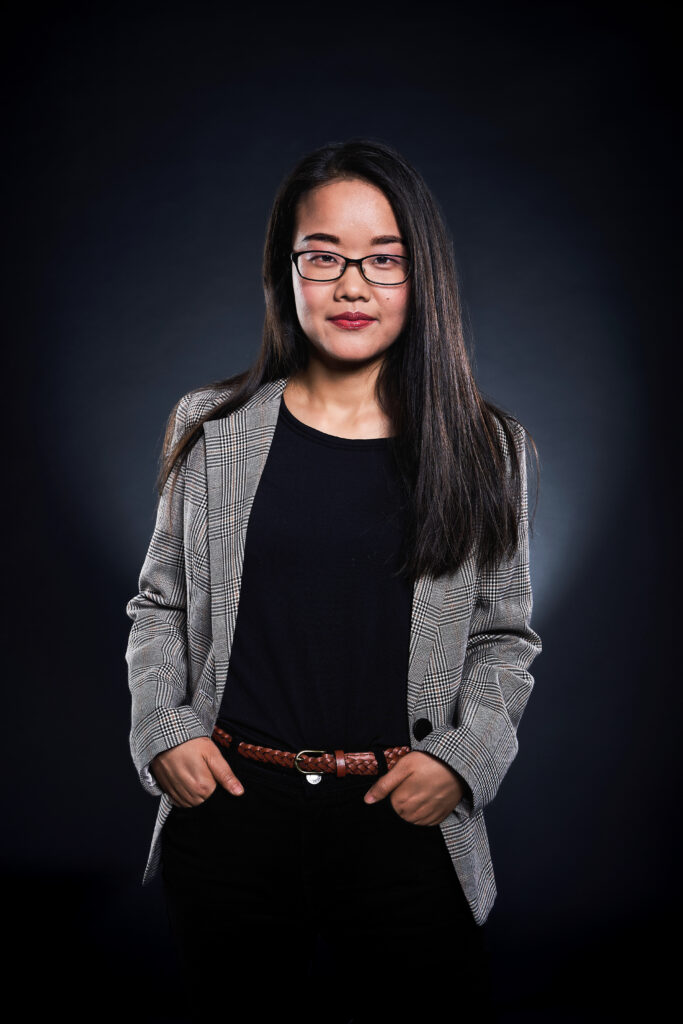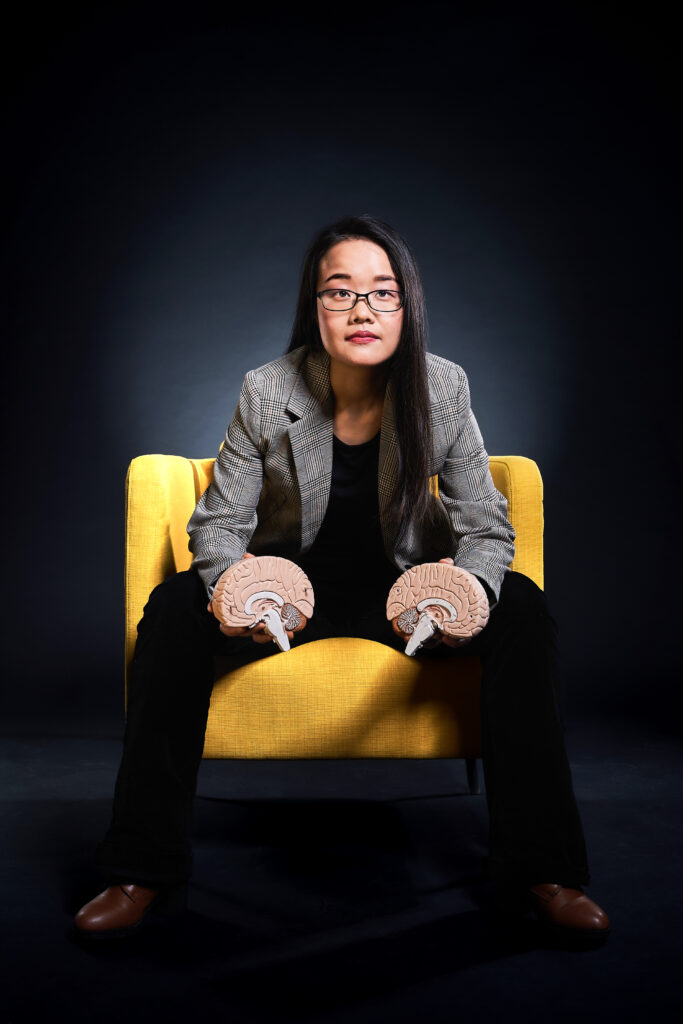When luck is not enough – Dr. Dengfeng “Dephie” Huang

“I just got really lucky,” shrugs Dephie and gives a small wave as if to brush off the attention. There may be things that can be called ‘luck’ on her path, but a simple dash of luck along the way does not make for an easy journey. At the moment, Dephie is working as a coordinator of Early Career Programs at the Cluster of Excellence CIBSS – Centre for Integrative Biological Signalling Studies at the University of Freiburg. How did she get to be in this mentoring position when her doctorate is in Medical Physics? “Just lucky,” she insists, pointing to such things as “meeting nice people” and “not having to worry about money”. However, as the conversation progresses, this argument becomes less and less convincing.
Things definitely were not always smooth sailing for her. She was not even supposed to end up in Freiburg; instead, she was fully prepared to start a PhD somewhere else in western Germany. A broken experimental machine and almost 1.5 years of waiting for slowly progressing repairs ultimately ended up driving her to pursue her research elsewhere. After months of searching, she was accepted into a research group in Freiburg, which was huge, collaborative, and full of learning opportunities. She wished that everything would work out smoothly the second time around. Yet, unexpected things still happened: In the middle of her PhD, her direct supervisor left the group for another country. When she got the news, she felt worried that ‘things go wrong’ again – unsure of what to expect and when she would be able to graduate.
She was lucky that the institute director took charge in Freiburg, while the direct supervisor helped her to revise the thesis despite of the long distance. Her nerves relaxed a bit. However, due to the long distance communication and as a result a longer than expected revision time, Dephie was struggling financially; the situation was taking a toll on her spirit. Luckily, the coordinator of the kite mentoring programme, Dr. Evelyn Rusdea, noticed that Dephie was becoming less engaged and more withdrawn. Quickly, a WhatsApp group was set up to cheer her up and accompany her until her graduation. They met regularly to talk about progress and give feedback. It was a great source of warmth and encouragement to her when she felt alone in Germany with her family far away and uncertain about the future.
Dephie was also still adjusting to her move from China to Germany. Hailing from a smaller city in China, one that Western tourists would frequent to experience “traditional China”, cultural differences were part of her everyday life. The language was an omnipresent barrier for her. Between navigating the Genitive and German bureaucracy, Dephie preferred focusing on research instead. Now, of course, German bureaucracy is a constant of her work that never ceases to amaze her. Those who meet Dephie for the first time and expect a shy, demure woman might be surprised, if not shocked, by her confidence and that surprisingly direct and a dry sense of humour.
The support network Dephie had established poured a lot of love and support into her and helped her regain her confidence. She learnt to break down seemingly endless things into small steps and to persevere, enabling her to graduate after all. The experience of a successful mentoring programme also informed her decision to apply for and become the coordinator for Early Career Programmes at CIBSS. Solving her financial struggles, she was able to start this position even before her graduation. Dephie may say that the job offer was luck − right time and place − but it was the result of the skills she had acquired herself and the social ties she had formed. Yet, she insists, without the support she received along the way, she would never have been able to finish her PhD and would not be where she is today.
In her new role, she is the link between Early Career Researchers (ECRs) who want to gain scientific independence and the Scientific Career Committee which is responsible for career support, including the review of research proposals and the distribution of research funds to ECRs. She took all the love and goodwill she has received from her previous mentoring experiences and is now paying it forward to the Postdoc Launchpad Programme. Her face lights up as she talks about the times she gets to inform an ambitious postdoc that their research proposal was approved. The good news is always a joy to deliver. The rejections were something she had to learn and accept as a necessary by-product of the approvals.
Dephie is the contact point for doctoral researchers and postdocs at CIBSS. Besides helping CIBSS-funded PhDs with their applications to the Spemann Graduate School of Biology and Medicine (SGBM), she organises workshops or events based on what the ECRs need most. However, not everyone who asks for help needs a workshop. Some approach her with concerns about their careers when they feel their time in academia is coming to an end. Her support for ‘her’ ECRs does not end with office hours; she makes herself available to them outside of a working environment. Sometimes, they meet in small groups in cafés and talk about personal issues, share memes, or discuss general topics, including the growing under-representation of women in advanced positions compared to early career stages.

“Guys can kind of always be themselves,” Dephie explains, looking back on her experiences in academia. It is a common perspective, that women experience much more societal pressure to excel at what they do. They should study hard and get into top programmes, and then, later on, be good mothers and focus only on childcare, often instead of or in addition to pursuing self-realisation. Even in academy, Dephie herself has experienced comments by some peers, such as “What are you still doing here? Shouldn’t you be at home getting pregnant?” or “Maybe you should be softer, you know, like a girl” when she challenged them in discussions. She also observed that women scientists often ‘shy away’ from opportunities to market themselves. They turn down invitations to speak at conferences because they fear they are not prepared enough, or because they are afraid of burdening others with the fact that they might have a child by the time the conference comes around – as if men do not get sick or fail under pressure. In her experience, not only are men more likely to seize opportunities to present their work, they also tend to ‘push the envelope‘, when it comes to compensation. Women ‘underselling’ their excellent research proposals because they feel “that’s enough money already” make Dephie grit her teeth because they could be pushing for so much more.
Thankfully, Dephie is surrounded by far more women now. She belongs to and nurtures a community with a solid support structure, passing on the energy and care that she has received. Dephie feels lucky to find herself in science management today, a place where her passion for mentoring coincides with scientific advancement. One of her most admired professors and mentors, Prof. Dr. Jürgen Hennig, always emphasised to everyone at the end of the year that „what you do should aim to influence the world.“ To Dephie, that spirit shines through when she makes her PhDs and postdocs feel ‘lucky,’ just as she does.